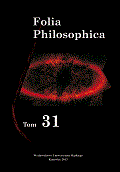Egologiczna a podmiotowa struktura świadomości
The structure of consciousness: egological and subjective
Author(s): Agnieszka WesołowskaSubject(s): Philosophy
Published by: Wydawnictwo Uniwersytetu Śląskiego
Keywords: transcendental consciousness; Edmund Husserl; Józef Tischner; phenomenology; egology
Summary/Abstract: The paper discusses Tischner’s interpretation of Husserl’s conception of consciousness in two aspects: egologic and subjective. In his notion of transcendental consciousness Husserl equates the transcendental ego with the subject of consciousness. However, in the course of development of his theory, he supplements the theory of ego with so-called habitual properties theory. Tischner stresses and characterises the difference between the transcendental ego and the subject of consciousness in his doctoral thesis Ja transcendentalne w filozofii E. Husserla (Transcendental ego in E. Husserl’s philosophy). According to Tischner, Husserl, by recognising the habitual properties of transcendental ego blurs the difference between the transcendental ego and a person. Hence, Tischner claims, two levels of consciousness (not recognise by Husserl himself) need to be recognised: the subjective level, which determines the subject as indispensable element of consciousness, and the egologic level, which refers to self-contained element of consciousness, which function as the transcendental ego. Setting apart heterogenic levels of analysis, as emphasised by Tischner, appears to be the key factor of development of his own work.
Journal: Folia Philosophica
- Issue Year: 2013
- Issue No: 31
- Page Range: 85-115
- Page Count: 31
- Language: Polish

